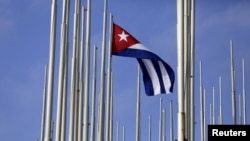Cuba and the Paris Club of wealthy creditor nations have agreed that Cuba owes $15 billion stemming from a 1986 default, an important first step toward renegotiating the debt, Western diplomats said.
"The final amount of $15 billion has been approved by both parties, so that is a big first step and now the creditors will meet to set policy for formal talks," said one of the diplomats with knowledge of the talks, speaking on condition of anonymity.
The figure represents the total that Cuba owes 16 Paris Club nations from its 1986 default and includes principal, service charges, interest and penalties.
The diplomats said the agreement was another sign that Cuba's communist government is interested in rejoining the global economy and adhering to international financial rules.
The two sides can now move on to the next phase of renegotiating payment terms. Cuba has achieved significant debt forgiveness in similar negotiations with other creditors in recent years.
Most Paris Club creditors are willing to show flexibility with Cuba due to their increased interest in doing business here following the Caribbean island's detente with the United States, the diplomats said.
U.S. President Barack Obama and Cuban President Raul Castro announced in December their governments would work toward a normalization of relations after decades of confrontation.
"Everyone wants to put this behind them now and move forward, and frankly, after 30 years I think the banks will be happy just to get something back," a European diplomat said.
Cuba does not comment on debt negotiations.
The government last reported its "active" foreign debt, accumulated after it declared a default, at $13.9 billion in 2011. It no longer reports its "passive" debt from before the default, which economists estimate at $8 billion plus interest, service charges and penalties owed governments and commercial creditors.
The Economist Intelligence Unit estimated Cuba's total foreign debt as $26 billion at the end of last year.
Negotiations with the Paris Club creditors would be the first since negotiations failed in 2001, in part due to a huge $35 billion debt owed Cuba's former benefactor the Soviet Union, and since then largely forgiven by Russia.
"I think both sides are more optimistic this time around," another European diplomat said. "The Russian issue is out of the way, relations are improving with the United States and the European Union, and Cuba is seeking international credibility and more investment."
The Paris Club is an informal group of creditor governments composed of Australia, Austria, Belgium, Britain, Canada, Denmark, Finland, France, Germany, Ireland, Italy, Japan, the Netherlands, Norway, Russian Federation, Spain, Sweden, Switzerland and the United States.
It has a special working group on Cuba that does not include the United States.
Russia and Germany have already negotiated bilateral agreements with Cuba, but want to participate as observers in the upcoming negotiations, the sources said.
Raul Castro, who replaced his ailing brother Fidel as president in 2008, has drastically reined in imports and cut state payrolls and subsidies while insisting the near-bankrupt government get its financial house in order and pledging to pay its past-due debts.
Cuba has had a trade and current account surplus since 2011 and has improved its payments record to creditors and suppliers.
In the past four years, Cuba has restructured its debt with Japanese commercial creditors, Mexico and Russia, each time obtaining reductions of 70 percent to 90 percent in what was owed in exchange for extended payment plans it could meet.
Cuba has also restructured its debt with China, estimated by local economists at more than $6 billion.









